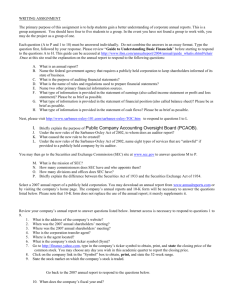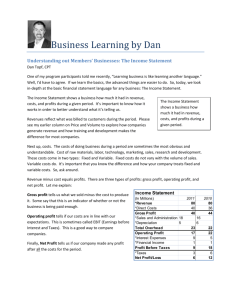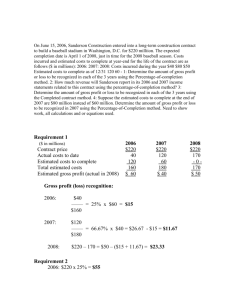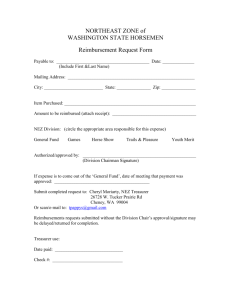Financial Terminology
advertisement
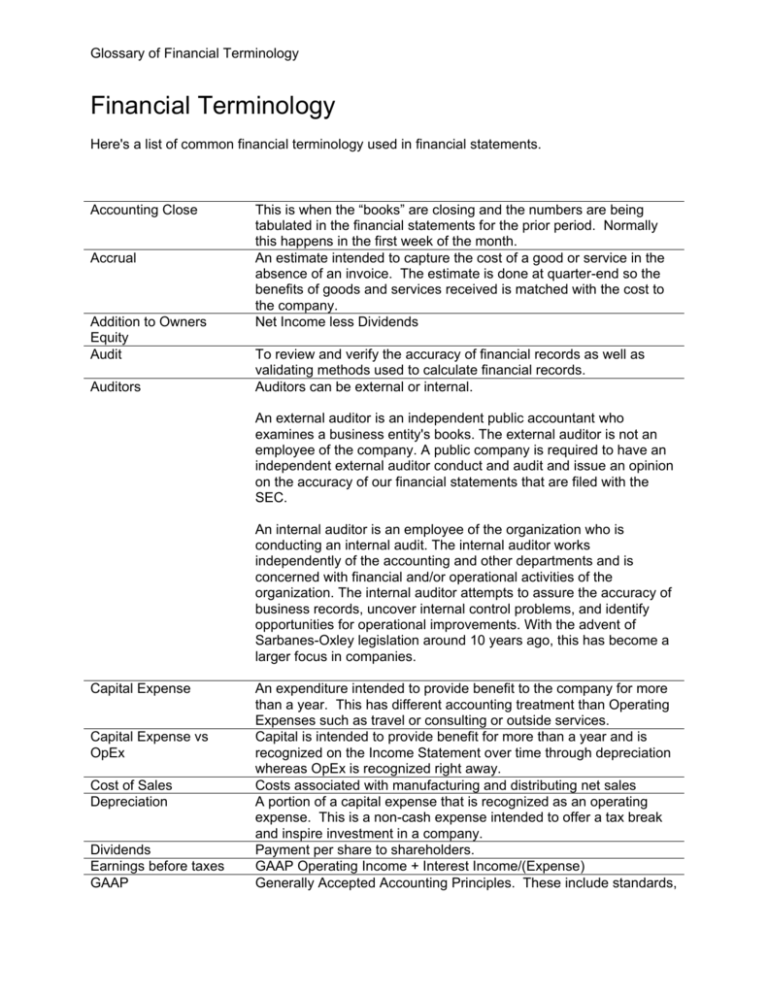
Glossary of Financial Terminology Financial Terminology Here's a list of common financial terminology used in financial statements. Accounting Close Accrual Addition to Owners Equity Audit Auditors This is when the “books” are closing and the numbers are being tabulated in the financial statements for the prior period. Normally this happens in the first week of the month. An estimate intended to capture the cost of a good or service in the absence of an invoice. The estimate is done at quarter-end so the benefits of goods and services received is matched with the cost to the company. Net Income less Dividends To review and verify the accuracy of financial records as well as validating methods used to calculate financial records. Auditors can be external or internal. An external auditor is an independent public accountant who examines a business entity's books. The external auditor is not an employee of the company. A public company is required to have an independent external auditor conduct and audit and issue an opinion on the accuracy of our financial statements that are filed with the SEC. An internal auditor is an employee of the organization who is conducting an internal audit. The internal auditor works independently of the accounting and other departments and is concerned with financial and/or operational activities of the organization. The internal auditor attempts to assure the accuracy of business records, uncover internal control problems, and identify opportunities for operational improvements. With the advent of Sarbanes-Oxley legislation around 10 years ago, this has become a larger focus in companies. Capital Expense Capital Expense vs OpEx Cost of Sales Depreciation Dividends Earnings before taxes GAAP An expenditure intended to provide benefit to the company for more than a year. This has different accounting treatment than Operating Expenses such as travel or consulting or outside services. Capital is intended to provide benefit for more than a year and is recognized on the Income Statement over time through depreciation whereas OpEx is recognized right away. Costs associated with manufacturing and distributing net sales A portion of a capital expense that is recognized as an operating expense. This is a non-cash expense intended to offer a tax break and inspire investment in a company. Payment per share to shareholders. GAAP Operating Income + Interest Income/(Expense) Generally Accepted Accounting Principles. These include standards, Glossary of Financial Terminology Gross Margin Gross Margin % Gross Profit Gross Sales Gross to Net Deductions Income Taxes Interest Income/(Expense) Net Income/(Loss) Net Sales Non-Cash Operating Expense (OpEx) Profit & Loss Research and Development (R&D) Sarbanes Oxley 404 (SOX404) Securities Exchange Act of 1934 conventions, and rules accountants follow in recording and summarizing transactions, and in the preparation of financial statements. Net Sales - Cost of Sales ((Net Sales - Cost of Sales) / Net Sales) Total Revenues minus Cost of Sales Sales at invoice values, not reduced by customer discounts, returns, allowances or other adjustments customer discounts, returns, prompt pay discounts, rebates Combination of Federal and state tax obligation on earnings before taxes Combination of interest received on our cash and interest paid to service debt Earnings before taxes less taxes Net product sales to customers (wholesalers); Gross Sales minus Gross to Net deductions Items recognized in the financial statements that do not deplete or add to cash for that period. An example is depreciation and stock based compensation. Expenditures recognized on the Income Statement that can be cash or non-cash. Typically, these are comprised of Salaries, Benefits, Bonus, Travel, Consultants, Outside Services, etc… This is also known as the “P&L”. This is the Profit and Loss statement which is the same as the Income statement. P&L, Profit & Loss and Income Statement can be used interchangeably. Research & Development spending - clinical, product development, research, etc. Wide-ranging U.S. corporate reform legislation, coauthored by the Democrat in charge of the Senate Banking Committee, Paul Sarbanes, and Republican Congressman Michael Oxley. The Act, which became law in July 2002, lays down stringent procedures regarding the accuracy and reliability of corporate disclosures, places restrictions on auditors providing non-audit services, and obliges top executives to verify the accounting in their companies personally. Each issuer's annual report must include an internal control report containing an assessment of the effectiveness of the internal control structure and procedures. Consequently, the internal control audit spans beyond Accounting and into IT and other areas. The Securities Exchange Act: (1) created the SEC and empowers the SEC with broad authority to regulate all aspects of the securities industry; (2) prohibits certain types of conduct in the securities markets and provides the SEC with disciplinary powers over regulated entities and persons associated with them; and (3) empowers the SEC to require periodic reporting of information by companies with publicly traded securities. Currently, companies with more than $10 million in assets whose Glossary of Financial Terminology securities are held by more than 500 owners must file certain reports, including without limitation annual reports (Form 10-K), quarterly reports (Form 10-Q) and current reports regarding certain material information (Form 8-K), which are available to the public through the SEC's EDGAR database. SG&A Stock Compensation Total Operating Expenses (Opex) Selling, General and Administrative spending - Sales Force, Marketing, Operations, Legal, IM, Finance, HR, Training, etc.. An expense associated with stock options, employee stock ownership plan & 401k match R&D plus SG&A
